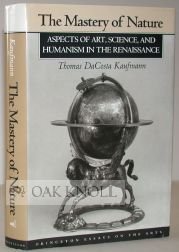Princeton Essays on the Arts
1 total work
Responding to ongoing debates over the role of humanism in the rise of empirical science, Thomas DaCosta Kaufmann explores the history of Renaissance art to help explain the complex beginnings of the "scientific revolution." In a rich collection of new and previously published essays addressing conceptions of the mastery of nature, he discusses the depiction of nature in works of art, scientific approaches to understanding the world, and imperial claims to world control. This interdisciplinary approach elucidates the varying ways art, science, and humanism interact. This book contains a new assessment of the origins of trompe-l'oeil illumination in manuscript painting in response to religious devotional practices; an account of the history of shadow projection in art theory in relation to perspective, astronomy, and optics; an analysis of poems by the painter Georg Hoefnagel demonstrating how religious, philosophical, and political concerns impinge on questions of imitation; ground-breaking interpretations of Arcimboldo's paintings of composite heads as imperial allegories; an account of a poet-astronomer's collaboration with artists; an essay on "Ancients" and "Moderns" in art and science in Prague; and a new review of art, politics, science, and the Kunstkammer.
